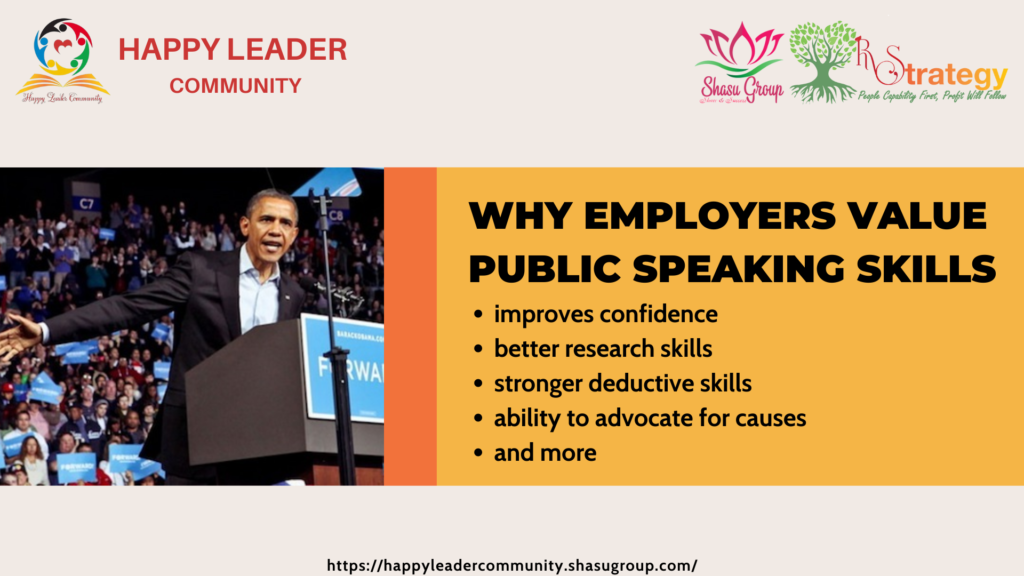What Is Public Speaking?
Public speaking is a soft skill that involves strong communication skills, zeal, and the ability to engage an audience. Soft skills are interpersonal abilities that focus on how you connect with others rather than technical abilities.
A public speaker is someone who makes a presentation to a gathering of people. Speaking to a small group of employees to presenting to a big audience at a national conference or event are all examples of presentations. Regardless of the size of the group, the same skill set and ability to speak in public are essential.
Why Employers Value Public Speaking Skills

Public speaking has played an important role in education, government, and business over the years. The power of words can be used to enlighten, persuade, educate, and even entertain. In the hands of the appropriate speaker, the spoken word can be even more powerful than the written word.
Tham gia cộng đồng học tập suốt đời cùng chúng tôi tại Happy Leader Community
You’ll benefit from developing your public speaking skills whether you’re a small business owner or a student. The following are some of the advantages of public speaking:
- improves confidence
- better research skills
- stronger deductive skills
- ability to advocate for causes
- and more
For firms to sell their offerings, it is extremely crucial to speak in public. This helps them to reach out to potential customers with their message. Salespeople and executives are frequently expected to be public speakers.
10 Tips for Improving Your Public Speaking Skills
1. Nervousness Is Normal. Practice and Prepare!
All people feel some physiological reactions like pounding hearts and trembling hands. Do not associate these feelings with the sense that you will perform poorly or make a fool of yourself. Some nerves are good. The adrenaline rush that makes you sweat also makes you more alert and ready to give your best performance.
The easiest method to combat anxiety is to prepare, prepare, and prepare some more. Take the time to go over your notes several times. Once you have become comfortable with the material, practice—a lot. Videotape yourself, or get a friend to critique your performance.
2. Know Your Audience. Your Speech Is About Them, Not You
Consider who your message is intended for before you start crafting message it. Learn as much about your listeners as you can. This will aid you in determining your word choice, information level, organizational structure, and motivational message.
Xem thêm về các nhóm của chúng tôi tại đây
3. Organize Your Materials in the Most Efficient Way to Achieve Your Goal
Make a structure for your speech. Make a list of the topic, overall goal, specific goal, central idea, and main points. In the opening 30 seconds, make sure you attract the audience’s attention.

4. Watch for Feedback and Adapt to It
Maintain your attention on the audience. Keep an eye on their reactions, change your message, and remain adaptable. Even the most loyal listeners will lose the attention of or confuse.
5. Let Your Personality Come Through
In whatever sort of communication, be yourself and avoid becoming a talking head. If your personality shines through, you will get more credibility, and your audience will trust what you have to say if they can perceive you as a real person.
6. Use Humor, Tell Stories, and Use Effective Language
If you include a humorous anecdote in your presentation, you will undoubtedly capture the attention of your audience. A personal touch in a speech is often appreciated by audiences. That is something that a story can deliver.
7. Don’t Read Unless You Have to. Work from an Outline
The interpersonal connection is broken when someone reads from a script or slides. You keep the focus on yourself and your message by maintaining eye contact with the audience. A brief outline can serve to jog your memory and keep you on task.
8. Use Your Voice and Hands Effectively. Omit Nervous Gestures
The majority of the message is conveyed through nonverbal communication. A good delivery does not draw attention to itself, but rather communicates the speaker’s ideas effectively and without interruption.
9. Grab Attention at the Beginning, and Close with a Dynamic End
Do you like when a speech begins with the phrase “Today I’m going to talk to you about X”? Most people don’t. Use a stunning statistic, an intriguing tale, or a succinct quotation instead. Finish your speech with a compelling statement and a summary that your audience will remember.
10. Use Audiovisual Aids Wisely
Use them judiciously since too many can disrupt the direct connection with the audience. They should enhance or clarify your content, or capture and maintain your audience’s attention.
Collection & Edit by Marketing Dept from Team Happy Leader Community – Shasu Group
Reference:
- https://professional.dce.harvard.edu/blog/10-tips-for-improving-your-public-speaking-skills/
- https://www.thebalancecareers.com/public-speaking-skills-with-examples-2059697
- https://business.tutsplus.com/tutorials/what-is-public-speaking–cms-31255
Follow us:
- Facebook: https://www.facebook.com/HappyLeaderCommunity
- Website: https://happyleadercommunity.shasugroup.com
Our Services
- Business Consultant: https://consultant.shasugroup.com/
- Executive, Business, Performance, Leadership Coaching & Mentoring: https://www.shasugroup.com/coaching-mentoring-consulting
- Training Solution: https://training.shasugroup.com/
- Fundraising & M&A Consultant: http://invest.shasugroup.com/
- International Sales Connection Service: http://export.shasugroup.com/
- Headhunter(Recruitment Service): https://hrstrategyvn.shasugroup.com/












